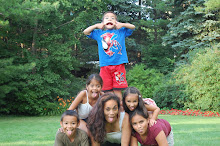Does having children change a husband and wife's relationship? What's the impact of that change? Does it make them closer or cause them to drift apart? The addition of a third wheel in our home definitely brought with it new challenges and learning opportunities. It shaped our relationship for years to come.
A little over six months after being married, my husband and I found out we were expecting our first child. What an exciting time it was for us. It was the excitement of the unknown. Not knowing what to expect because parenthood was something new for the both of us. Did becoming parents affect our marriage in any way? How does one cope with the new addition to the family, while preserving the marriage relationship? In an excerpt from her book, “The Complete Idiot's Guide to Motherhood”, author Deborah Levine Herman stated:
“It is so important not to take your relationship for granted. Couples drift apart for what can seem like the most trivial of reasons, and the stress of a new baby in the house is hardly a trivial pressure. Even without a baby, you know that a good relationship needs constant nourishment and care, so don't let these new pressures make you forget to take that care. Keep those lines of communication open, keep expressing your feelings and lavishing love on one another as much as possible (Herman).”
After giving birth to our eldest daughter, I felt that her needs were much more important than anyone else's. That included my husband's needs. As a new mom, and with each subsequent birth, this pattern pretty much continued. I realize now that I unconsciously allowed myself to become just “mommy” and neglected being “babe” or “sweetie” to my husband. With this realization, I see the impact this had on my relationship with my husband over the years. If only I knew then what I know now.
As a couple, we've learned that our needs come first. We must take care of and tend to each other's needs and desires in order for our relationship to grow and flourish. Does this mean that we have to neglect our children to maintain our relationship? No. Like all things in life, balance is essential.
You might wonder (as some of you have) how my husband and I find time for each other. With six kids, work, a lack of sleep and all the demands of life going on, the key is not finding time but making time. I'll be the first to tell you there's not enough hours in a day, but the amount of time is less important than what you do with your time. It's all about quality over quantity.
